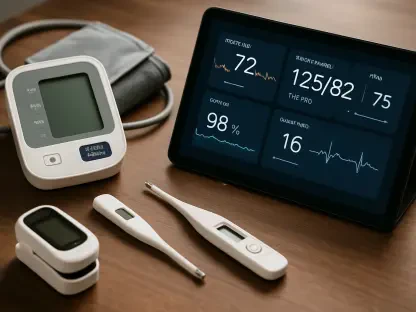As digital health technologies continue to reshape healthcare systems worldwide, Ireland stands at a pivotal moment in its journey toward modernization, grappling with a blend of promising advancements and persistent challenges that test its readiness for a full transformation in 2025. The nation has long lagged behind many European peers in adopting essential tools like electronic health records (EHRs) and interoperable data systems, but recent efforts signal a shift toward progress. With initiatives like the Health Service Executive (HSE) Digital Roadmap gaining traction, there’s a renewed focus on patient-centered care and expanded access to digital services. Yet, significant obstacles—ranging from cybersecurity vulnerabilities to disparities in digital access—cast doubt on the pace and equity of this transformation. Drawing from a comprehensive survey of over 400 Irish clinicians, IT leaders, and patients, this exploration delves into the current state of digital health in Ireland, uncovering both the strides made and the barriers that remain.
Progress and Innovation in Ireland’s Digital Health Ecosystem
Emerging Technologies and Clinician Confidence
Ireland’s healthcare sector is witnessing a surge in enthusiasm for innovative technologies, particularly among clinicians who are increasingly open to integrating advanced tools into their practice. A striking 72% of clinicians now express confidence in artificial intelligence (AI) for supporting clinical decision-making, a significant leap from just a year ago. This growing acceptance reflects a broader trend of modernization, driven by policy efforts like the HSE Digital Roadmap, which prioritizes the adoption of cutting-edge solutions. The roadmap, alongside tools like the HSE Health App, aims to streamline patient care and enhance accessibility. However, while clinicians are eager to embrace these advancements, concerns linger about whether the necessary infrastructure and training are in place to support such rapid integration, especially in under-resourced facilities.
The momentum behind emerging technologies also highlights a critical need for interoperability among systems. Many healthcare providers struggle with fragmented data platforms that hinder seamless care delivery. Fortunately, certain vendors have stepped up, offering solutions tailored to Ireland’s unique needs. Companies excelling in EHR integration and cross-system data sharing are earning high satisfaction ratings from users, as they address the demand for cohesive and user-friendly tools. Despite this progress, the gap between clinician optimism and systemic readiness remains a pressing issue. Without adequate funding and workforce development, the risk of uneven implementation looms large, potentially leaving some regions or demographics unable to benefit from these technological strides.
Policy Initiatives Driving Change
Government-led initiatives are playing a central role in pushing Ireland’s digital health agenda forward, with the HSE at the forefront of this transformation. The Digital Roadmap outlines a clear vision for modernizing healthcare through enhanced digital access and patient engagement platforms, aiming to create a more connected and responsive system. Over the past year, tangible steps have been taken to roll out applications and services that empower patients to manage their health more effectively. These efforts signal a commitment to addressing long-standing inefficiencies, particularly in how data is shared across providers, which has historically been a weak point in the Irish system.
Yet, policy alone cannot guarantee success without addressing the underlying resource constraints that threaten equitable progress. While the intent behind these initiatives is commendable, many stakeholders point to a lack of budget and skilled personnel as significant hurdles. Clinicians, though supportive of the direction, often note that the pace of change feels mismatched with the reality on the ground. Rural hospitals, for instance, frequently lack the connectivity and staff training needed to fully leverage new digital tools. Bridging this gap will require not just strategic planning but also targeted investments to ensure that the benefits of policy-driven innovation reach every corner of the nation, rather than remaining confined to urban centers.
Challenges Hindering Digital Health Transformation
Cybersecurity Threats and Patient Safety Concerns
One of the most alarming barriers to Ireland’s digital health evolution is the persistent vulnerability to cybersecurity threats, a concern heightened by past incidents that exposed systemic weaknesses. IT leaders overwhelmingly recognize cybersecurity as a patient safety issue, with 87% acknowledging its critical importance. However, only a small fraction—29%—believe their organizations are adequately prepared to handle future attacks. This disconnect between awareness and readiness underscores a troubling reality: despite increased focus on securing health data, many systems remain at risk, potentially compromising sensitive patient information and disrupting care delivery.
The urgency of this issue extends beyond technical fixes to the broader challenge of rebuilding trust in digital systems. Patients and providers alike remain wary after high-profile breaches, which have eroded confidence in the safety of health technologies. Addressing this requires a multifaceted approach, including robust investment in security infrastructure and transparent communication about protective measures. Without such efforts, the fear of data exposure could deter both clinicians and the public from fully engaging with digital tools, stalling progress. As Ireland pushes forward, prioritizing cybersecurity as a foundational element of healthcare transformation will be essential to safeguarding the system’s integrity.
Digital Divide and Public Trust Issues
Access disparities represent another formidable challenge, with a stark contrast between urban and rural populations in their ability to engage with digital health services. Survey findings reveal that 73% of rural patients face difficulties using these tools, compared to just 18% in urban areas, highlighting a digital divide that risks exacerbating existing health inequities. Aging populations, often less familiar with technology, further compound this issue, as do economic barriers that limit access to devices and reliable internet. If left unaddressed, this gap could undermine the goal of a universally accessible healthcare system.
Equally concerning is the erosion of public trust, particularly around AI-driven tools, where 84% of patients express skepticism about their reliability in decision-making. This stands in sharp contrast to clinician optimism, creating a divide that could slow adoption. Building confidence will require not only education campaigns to demystify these technologies but also a commitment to ensuring equitable access across all demographics. Tackling these intertwined issues of trust and accessibility demands a concerted effort from policymakers, providers, and technology vendors to design solutions that are inclusive and transparent, ensuring no one is left behind in this digital shift.
Looking Back: Lessons for Sustainable Progress
Reflecting on Ireland’s digital health journey, it becomes evident that while strides have been made in policy and clinician engagement, deep-rooted challenges like cybersecurity gaps and access disparities demand urgent resolution. The enthusiasm for AI and interoperable systems among healthcare professionals stands as a testament to the sector’s potential, yet public hesitancy and resource limitations often temper this optimism. Vendor innovations provide a glimpse of what tailored solutions can achieve, but systemic issues require broader attention. Moving forward, the focus should shift to actionable strategies—strengthening security frameworks, investing in rural connectivity, and fostering public trust through education. Only by addressing these foundational needs can Ireland hope to build a resilient and inclusive digital health ecosystem, ensuring that the benefits of transformation reach every citizen, regardless of location or background.









